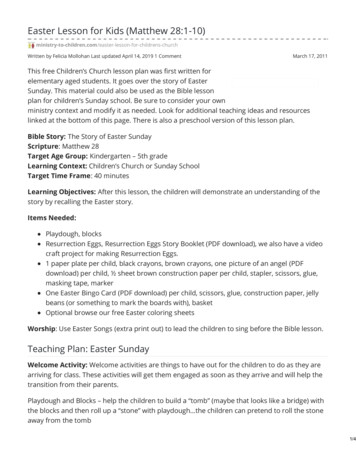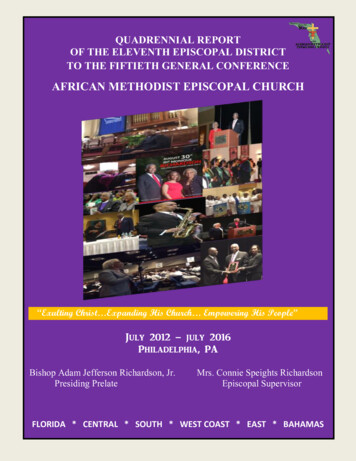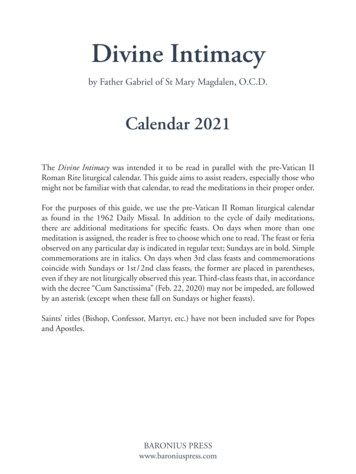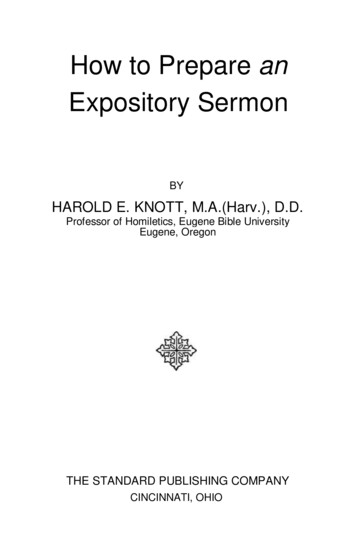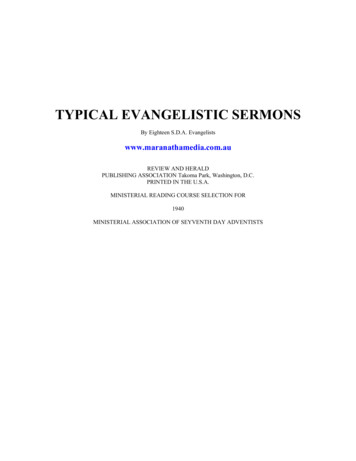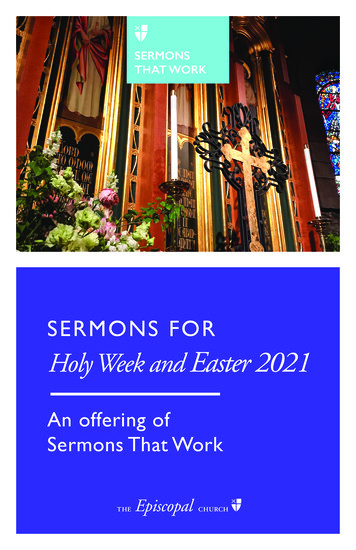
Transcription
SERMONSTHAT WORKSERMONS FORHoly Week and Easter 2021An offering ofSermons That WorkTHEEpiscopalCHURCH
Holy Week 2021Dear Reader,Thank you for downloading Sermons for Holy Week and Easter2021, a collection of materials prepared by some of the bestpreachers from across The Episcopal Church.Sermons That Work, a ministry of The Episcopal Church’sOffice of Communication, has provided free and high-qualitysermons, Bible studies, and bulletin inserts since 1995.Every week, it is our pleasure to source, review, andpublish these pieces; we hope they are edifying as youhear, read, mark, learn, and inwardly digest these and theircorresponding scriptures.In January 2020, in order to meet the demands of aproduction schedule, I wrote a welcome letter for lastyear’s compilation of Holy Week sermons. These are notfun letters to write; luckily (I guess), the cold and darknessof winter in Minnesota provides a fitting setting in which towrite on death, mourning, sadness, and the hardness of thehuman heart.But no cold night could have prepared me – or any of us –for what was to come.As February and early March of last year unfolded, therewas little to suggest the cataclysmic events of 2020 were2approaching. And suddenly, worship services were cancelledand put online. And travel plans were cancelled. And schoolswere closed. And work went fully remote for many of us. Andthen the sickness and death spread around our communities,upending nearly everything that we had worked hard to plan,to create, to do. For more than a year, we have felt completelypowerless – longing for something, anything, to prop us up alittle longer.I don’t write that purely to revisit very, very hard times. Ialso don’t write it with a rosy ending in mind, turning thepandemic into a morality play – no, we have lived through abad time indeed, afflicted by disease, economic uncertainty,rampant hunger, failing businesses, mental health calamity, lostyears of education and sobriety and work and time with ourfriends and families, and so, so much more.Rather, I am revisiting where we have been because we needto keep going. This path, while long, has been punctuated withheroic ministry by our congregations and dioceses. While wehave felt lonely, we have not been abandoned – not by God,not by the Church - this we know. But there are many morewho do not know this. This year, we have a particular urgencyaround sharing the love of our Lord with our devastatedcommunities. It will take a lot of effort and strength, but mostimportantly, it will take courage. So, like Jesus, we set ourfaces toward Jerusalem, walking together through pain andtoward Resurrection.On behalf of Sermons That Work and The Episcopal Church’sOffice of Communication, I wish you a blessed Holy Weekand a joyous Easter.Your brother in Christ,Christopher SikkemaThe Episcopal Church3
The Sunday of the Passion: Palm SundayCOLLECT:Almighty and everliving God, in your tender love for thehuman race you sent your Son our Savior Jesus Christ totake upon him our nature, and to suffer death upon the cross,giving us the example of his great humility: Mercifully grantthat we may walk in the way of his suffering, and also share inhis resurrection; through Jesus Christ our Lord, who lives andreigns with you and the Holy Spirit, one God, for ever andever. Amen.READINGS:ISAIAH 50 :4 -9A; PSALM 31:9-16; PHILIPPIANS2 :5-11; MARK 14:1-15:47 OR MARK 15:1-39, [40 - 47]IT’S HOLY WEEK . SO WHAT?by the Rev. Anna TewWith so much going on in the world, it may seem almost sillyto insist on giving so much time and energy to the religiousobservance of Holy Week. This is especially true when oneconsiders that so many people around us may only payattention on Easter at best, and even that, for some, is at leastpartially out of obligation.Add the difficulties of the pandemic on top of that, and thefact that most churches still cannot meet in person, and HolyWeek itself may begin to feel a bit out of touch with theworld around us.We alone do not have precise answers for the humansuffering that we see around us, for violence or death or4disease – or where to find hope. What we do know, however,is that the narratives that form us — the stories of ourfamilies, our country, our faith — are the eyeglasses throughwhich we see the stories on the news and the things aroundus. It’s through those stories that we come to conclusionsabout ourselves and our world and what is hopeless andwhat is redeemable. It’s through those stories that we seeourselves and our places in the world.If your family story is that the people in your bloodline aregiving and caring people, then you, too, will be encouraged tobe generous and attentive. If we believe that America’s storyis one of ingenuity and bravery, then a true patriot will dotheir best to have courage and see creative solutions to eventhe most daunting problems.Religious stories are even bigger than that. They tell us notonly how we should live, but how we got here and wherewe’re going. During Holy Week and Easter, here in thenorthern hemisphere, we tell the story of the Resurrectionjust as we watch creation come back to life in the springtime.This week, we religiously observant Christians have theopportunity to live through the story we proclaim, day byday: the story of the last days of Jesus Christ, his last mealwith his friends, his death by execution, and an unexpectedand joyous ending. We do so with our ancestors in faith, andwe do so with those yet to be born, who will follow us inHoly Weeks to come.Right when things seem at a tipping point in our nation andour world, this story is calling to us again, if we dare to seethe world through it. We are invited to forget that we knowhow this Holy Week story ends and place ourselves intothe story itself: to feel the palm branches, to taste wine and5
bread, to feel cool water on our feet as they are washed, andto come and mourn at the foot of a wooden cross. Thoughmost of us cannot experience many, if any, of these things inperson this year, we remember how they felt, and we darenever take them for granted again.In a world surrounded by disease, death, and suffering, we arebeing called to stare both love and suffering — God’s ownlove and suffering — in the face.Our Holy Week story begins today, whether we grip actualpalm branches this year or not. The palms we typically waveon Palm Sunday are burned the following year, as the storybegins again.We are called today into the story of Jesus – and called topay attention to it anew. We have come to the holy city,Jerusalem, where Christ is entering, riding on a colt, or adonkey, or both, depending on which Gospel you read.As Jesus rides along, a crowd begins to gather. Of course, thisis before social media could gather people from all over theplace in minutes, way back when members of a crowd had tohear and see and decide to gather on the spot. And the oddthing about the way the Gospels tell this story is that the cityand the crowds become speaking characters.As Matthew puts it: “When [Jesus] entered Jerusalem, the wholecity was in turmoil, asking, ‘Who is this?’The crowds were saying,‘This is the prophet Jesus from Nazareth in Galilee.’”Anyone who has ever loved a city — or any place, really— knows that places have personalities. Each place decideswhat it values, and it shapes everything from its streets to itsTHE Episcopalrituals. Jerusalem herecan be safelyCHURCHclassified as “skeptical.”It is a place where major religions are born, and messiahsare common.And yet, a crowd still comes to gather around Jesus, theprophet and teacher who has been drawing huge crowds,the one who is rumored to have healed the sick and drivenout demons and restored sight to the blind and even raisedthe dead.The crowds gathered around God in the flesh, celebrating hisarrival, shouting, “Hosanna to the Son of David!” He was, theybelieved, the one to save them from oppression.Jesus knows how this story will end. He knows it will bepainful. But Jesus still shows up.And Jesus will show up on Sunday whether or not any ofus shows up, in whatever ways we safely can, to form ourcommunity around the story. Jesus will show up whether ornot we choose to see our world through this story.You may not be able to attend to this story as much as youwould like. None of us can, really, for the second year in arow, because of the pandemic.You may also have work orfamily or school obligations or you may just be exhaustedfrom all you have to do. That’s okay.The Resurrection will happen anyway. It is an eternal truth.It happened once, and Christians around the world singit and tell it again, every year, with or without ourpersonal involvement.We are each invited, however, to be part of it. To let thisstory form us. To see the world through it and maybe,just maybe, begin to answer some hard questions about7
justice and peace and disease and suffering and death andresurrection and hope. So even if you can’t attend to it theway you’re used to or the way you might like — take sometime to observe and ponder: Maundy Thursday and the LastSupper. Good Friday and the Crucifixion. Holy Saturday andthe Great Vigil of Easter, as the Church retells the wholesalvation story again.We are in this story, now.The Rev. Anna Tew is a Lutheran pastor serving Our Savior’sLutheran Church in South Hadley, Massachusetts. A product ofseveral places, she was born and raised in rural south Alabama,lived most of her adult life to date in Atlanta, and has called NewEngland home for the past four years. Anna graduated from theCandler School of Theology in 2011, and since then she has servedin both parish ministry and hospital chaplaincy. In her spare time,Anna enjoys keeping up with politics and pop culture (especiallymusic), hiking, running, and CrossFit.From now on, you are the crowds, even if we are physicallyapart.You are the disciples.You are the witnesses.Forget that you know how this story ends. Learn again to seeyour world through new eyes, through the disciples’ eyes, sothat maybe we can find hope for justice and healing in themidst of the chaos and pain in the world around us. Becausethe disciples, in their world, also knew chaos and pain andfear and death.Put on the eyeglasses of the story of Jesus, just for thisweek, again.And as the Resurrection comes again to us next week,may we leave with hope renewed that surprise endings arepossible, that hope is not lost, and that even Death is notgreater than God, nor greater than love. That if Christ canrise from the dead, then surely, surely, there is hope for us.Let us tell the Story again. Amen.89
Monday in Holy WeekCOLLECTAlmighty God, whose most dear Son went not up to joy butfirst he suffered pain, and entered not into glory before hewas crucified: Mercifully grant that we, walking in the wayof the cross, may find it none other than the way of life andpeace; through Jesus Christ your Son our Lord, who lives andreigns with you and the Holy Spirit, one God, for ever andever. Amen.READINGS:ISAIAH 42 :1-9; PSALM 36:5-11; HEBREWS 9:11-15;JOHN 12 :1-11CLOSENESSby the Rev. Jazzy BostockThis story of anointing, fragrance, intimacy, and risk – it’s ahard story not to love. And, this year, it seems particularlypoignant – a reminder to hold those you love close, for wedo not know how much time we have together. This year hasbeen littered with loss and grief – and few, if any, of us hadthe foresight that Mary did – the foresight to lavish those weadore with our most costly perfume before the time camefor us to part.In our story, Mary has a pound of costly perfume. The gospelsays it’s nard, but maybe you could imagine something fromyour mother’s bathroom counters, one of the heavy glassbottles filled with expensive scent – the kind you weren’tallowed to touch when you were young. Mary takes thisexpensive bottle and empties it, slathering Jesus’ feet in the10scent and leaning in to wipe off the dirt and the excess withher hair.When we actually consider this – what it would be like towipe someone’s feet with our hair – we might be horrified.Even without a year of social distancing behind us, this kindof closeness makes us squirm. Mary, though, is so overcomewith love for Jesus that she transcends the norms and thebarriers, and simply does what she feels is right at thatmoment. She makes an offering to the Savior she adores.The disciples see this woman having an incredibly intimatemoment with their friend, and they are disgusted. They thinkshe is out of place, that she doesn’t belong where she has putherself. They comment that she is wasting her money, pouringit down the drain by using her perfume for this anointing.This moment must have been uncomfortable for them –the rich smell of the oil is around them, and Mary is kneelingwith her face almost touching Jesus’ feet. Jesus puts a stop totheir chatter. “Leave her alone,” he says. Jesus takes a momentthat is being perceived by the disciples as ugly and makes ussee it as beautiful. He ignores their discomfort and blessesthis intimate moment. He consecrates it – making it holyand cherished.In our world, this intimacy is rare, if not impossible, tocome by. We are taught from when we are young thateveryone has a personal bubble of space around them, andwe need to appreciate that. We are not often encouragedto feel the Holy Spirit moving us toward intimate and closemoments with friends; we are more often told to suppressthat urge, lest we look weird, or out of place, or makesomeone uncomfortable. Living through a pandemic that hastaught us to observe six feet of social distance has increasedour isolation.11
This gospel lesson challenges our sense of boundary, invitingus to overcome our fears and offer closeness even in platonicrelationships. What would our lives look like if we loved Jesuslike Mary did? This love is consuming and abundant – to beso overcome with love as to give away something preciousand break the barriers of culture to be drawn into an evendeeper and more intimate relationship with God.The Rev. Jazzy Bostock is a recently ordained kanaka maoliwoman, serving her curacy at St. Peter’s Episcopal Church inHonolulu, Hawaii. She is thrilled to be back in the ‘aina, the land,which raised her, and the waves of the Pacific Ocean. She loves thewarm sun, gardening, cooking, laughing, and seeing God at work.She strives to love God more deeply, more fully, with every breathshe takes.Mary was overcome with the sense of needing to dosomething right now, and she followed her heart. Soon, Jesuswould no longer be with the disciples. We are preparingnow for Holy Week, preparing for Jesus’ crucifixion andresurrection. There is no better time than right now to showthe people we love not only that we love them – but also thedepth of that feeling. We are constantly reminded that life isshort, and we are invited today to seize every moment weare gifted, and to turn those moments into sacred beauty byshowing intimacy and vulnerability with one another.The poor will always be with us, Jesus says. Perhaps wecan also read this as our distractions, our problems, thedifficulties and heartaches of this life will always be withus. But that doesn’t mean we can’t take the time to focuson one another, to be present and close and abundant andextravagant with our love for one another. Spending timewith one another, showing our love, doesn’t mean our workis finished. It doesn’t mean that our to-do lists are empty,or that everything else is perfect. No – Jesus is blessing thetime we spend together, blessing our falling in love with theChrist in one another, and blessing us as we are drawn intoan intimate closeness of relationship. We are invited to hearthe message of abundance and intimacy that Mary brings. Weare invited to fall more deeply in love with Christ.1213
Tuesday in Holy WeekCOLLECTO God, by the passion of your blessed Son you made aninstrument of shameful death to be for us the means of life:Grant us so to glory in the cross of Christ, that we maygladly suffer shame and loss for the sake of your Son ourSavior Jesus Christ; who lives and reigns with you and theHoly Spirit, one God, for ever and ever. Amen.READINGS:ISAIAH 49:1-7; PSALM 71:1-14; 1 CORINTHIANS1:18 -31; JOHN 12 :20 -36UPSIDE DOWNby the Rev. Joseph S. PaganoIn our epistle lesson, Paul deflates claims of believers whopuff themselves up.The First Letter to the Corinthians is addressed to a churchexperiencing divisions and scandals. A lot of them. Part of theproblem seems to be a group of self-styled, super-spiritualpeople. As Paul puts it, they are “puffed-up.” They flaunttheir superior wisdom. They demean others whom theyconsidered socially and spiritually dull: Très déclassé!The super-spiritual much preferred the sophisticationand eloquence of Apollos’ sermons to Paul’s inarticulateramblings. They spoke in tongues and didn’t much care if youwere too stupid to understand.You were either in the know-- in the spiritual in crowd -- or not. They thought themselvesabove silly conventions about food and sex, and if their14outré behavior scandalized unenlightened blockheads, toobad for them.In our passage from First Corinthians, Paul lets the air out ofthe balloon of the super-spiritual. He says, “the message aboutthe cross is foolishness to those who are perishing, but to uswho are being saved it is the power of God. For it is written,‘I will destroy the wisdom of the wise, and the discernmentof the discerning I will thwart.’ Where is the one who iswise? Where is the scribe? Where is the debater of thisage? Has not God made foolish the wisdom of the world?”The proclamation of the cross punctures inflated claimsto wisdom. Paul explains: “We proclaim Christ crucified, astumbling block to Jews and foolishness to Gentiles, but tothose who are the called, both Jews and Greeks, Christ thepower of God and the wisdom of God. For God’s foolishnessis wiser than human wisdom, and God’s weakness is strongerthan human strength.”Paul sets out a dramatic, counterintuitive contrast. ForGentiles, the idea of a crucified Lord is plain foolishness. Howcan a god be at once powerful and also executed by Rome?A famous caricature found in ancient Rome depicts a slavefalling down before a crucified donkey, under which are thewords, “Alexamenos worships his god.” That pretty muchsums up the Gentiles’ response to the message of the cross:foolishness. As for Jews, the idea of a crucified messiah was anoxymoron. They looked for a messiah who would come andtriumph over the Romans – not be executed by them. Theclaim that the crucifixion of Jesus was the center and climaxof his messianic role was offensive: “Cursed is everyone whohas been hanged on a tree” (Gal. 3:13; cf. Deut. 21:23). Forthe Jews, the message about a crucified messiah is scandalous.The proclamation of Christ crucified turns things upside15
down. Through the message of the cross, the wisdom ofthe world is made foolish. Through the scandal of the cross,weakness dethrones the powerful. The proclamation ofthe crucified Messiah is a sword of the spirit. To those whodo not respond to this revelation, the cross is scandalousfolly. For those who are being saved by this message, thefoolishness and weakness of Christ crucified reveals thepower and wisdom of God.Paul uses a variety of metaphors to spell out the savingpower and wisdom of the cross. At different times and indifferent places, Paul speaks of Christ’s death in terms ofsacrifice, redemption, representation, reconciliation, andconquest of the powers of sin and death. The height, depth,centrality, and expansiveness of Christ’s death are beyond thegrasp of one image, one metaphor, one theory, one humantelling. They all, however, point to the action, initiative, andlove of God in Christ. They all also bear fruit in a varietyof responses: freedom from bondage, forgiveness of sins,reconciliation to God, righteousness, peace, cruciform livesand cruciform communities.The wisdom of the cross is decidedly not the wisdom ofthe world. To Jewish scribes or Gentile philosophers, themessage of the crucified Messiah can lead only to trippingover a stumbling block or doubling over in laughter. But forthose who respond to such “foolishness,” the proclamationof Christ crucified is none other than the power of Godunto salvation.Paul uses this message to take the wind out of the superspiritual Corinthians’ claims to wisdom and power. Onewonders if Paul also thought the Corinthian elitists wereputting on airs. He reminds them of their calling: “Not manyof you were wise by human standards, not many were16powerful, not many were of noble birth. But God chosewhat is foolish in the world to shame the wise; God chosewhat is weak in the world to shame the strong; God chosewhat is low and despised in the world, things that are not,to reduce to nothing things that are, so that no one mightboast in the presence of God.” In this passage, Paul seemsto be not only proving a point about the wisdom of thecross but also calling out the pretentiousness of the superspiritual types. That is to say, not only does the word of thecross up-end the Corinthians’ claims to wisdom and power,but Paul also points out that even by worldly standards, notmany folks had much to boast about. It reminds one of thecharacter Hyacinth Bucket, from the comedy “Keeping UpAppearances,” who insists that her surname is pronounced“Bouquet.” Or perhaps, for those of us who grew up with theMuppets, one thinks of Miss Piggy saying, “Pretentious? Moi?”Paul seems to be saying to the puffed-up Corinthians thatnot only are their ideas about wisdom and power at oddswith the Gospel but also that they are acting like a group ofposeurs in their claims to superior knowledge and abilities.In addition to pointing out that the super-spiritual Christianswere getting too big for their britches, Paul is also saying thatthe make-up of the church at Corinth is a demonstrationof his radical claims about God’s wisdom and power. Justlook at yourselves, Paul says. Clearly, God is not impressedwith worldly power or wisdom because God has called sofew who are wise or rich or noble. Rather, God has calledmany who are “low and despised.” The God revealed inChrist crucified has a preference for the lower rungs ofsociety, overturns our ideas about who is wise and who isnot, and makes somebodies out of nobodies. Paul remindsthem that God “is the source of your life in Christ Jesus, whobecame for us wisdom from God, and righteousness andsanctification and redemption, in order that, as it is written,17
‘Let the one who boasts, boast in the Lord.’” The crucifiedChrist is true wisdom and power because it is through himthat we have received righteousness, sanctification, andredemption. When the puffed-up boast about their superiorwisdom and abilities, it’s not just an instance of arrogance orpretentiousness. It’s to miss the whole point of the messageabout the cross. If anyone at Corinth feels the need to boast,let them boast in the crucified Lord.It would be nice to tell ourselves that our churches todayno longer experience division and scandal, that we no longerhave problems with groups of Christians who puff themselvesup with claims to superior wisdom and gifts, who demeanother Christians whom they think unenlightened, who lookwith contempt upon other people’s vulgar practices orsimplistic pieties. But we know that this is not so.It is always easier to point out these attitudes in others. Wethink of proponents of the prosperity gospel whose messagesuggests that Jesus came to bring us bling rather than to callus to take up our cross and follow him on the way of costlylove; or of Christian nationalists who seek to wield worldlypolitical power rather than follow the crucified Lord whoreigns from the cross; or of self-styled “strong” Christianbelievers whose promise “to pray for” others often comesacross more as condescending dismissal of other peoples’beliefs and practices than a sincere desire to build up thebody of Christ; or of hip Christians in skinny jeans andstatement glasses who are called to influence the influencers;and so forth and so on But this is too obviously a case of the mote and the beam.How often have we heard fellow Episcopalians say, “In ourchurch, we don’t have to check our brains at the door”?The clear implication of such a statement is that we are18wiser in our church than people in other churches wherepresumably they do check their brains at the door. Howoften have we heard Episcopalians speak condescendinglyabout the power and beauty of our Anglican liturgy, itsrubrical infallibility, and with disdain about other Christianswho wouldn’t know the difference between a fiddlebackchasuble and a pair of PJs. Or how often in Anglican historyhave we defined ourselves as not like those neo-pagan papistsor not like those holy rolling enthusiasts? All of which is tosay, how often have we spoken of ourselves as possessingsuperior wisdom and looked down upon others whom wedeem inferior?This Tuesday in Holy Week is an opportunity to rememberthe message of the cross. Through the foolishness andweakness of Christ crucified, God reveals true wisdom andpower. The word of the cross overturns all our ideas aboutworldly power and wisdom: “God chose what is foolish inthe world to shame the wise; God chose what is weak inthe world to shame the strong.” The proclamation of Christcrucified undercuts any basis for boasting of superior wisdomor super-spiritual gifts. If we must boast, then let us boastonly in our crucified Lord. As our collect for today puts it:“O God, by the passion of your blessed Son you made aninstrument of shameful death to be for us the means of life:Grant us so to glory in the cross of Christ, that we maygladly suffer shame and loss for the sake of your Son ourSavior Jesus Christ; who lives and reigns with you and theHoly Spirit, one God, for ever and ever.”The Rev. Joseph S. Pagano is an Episcopal priest who serves inthe Anglican Parish of Pasadena and Cormack in Newfoundland,Canada. He is a faculty member in theology at Queen’s College inSt. John’s, Newfoundland. His most recent book is Common Prayer:Reflections on Episcopal Worship.19
Wednesday in Holy WeekCOLLECTLord God, whose blessed Son our Savior gave his body to bewhipped and his face to be spit upon: Give us grace to acceptjoyfully the sufferings of the present time, confident of theglory that shall be revealed; through Jesus Christ your Sonour Lord, who lives and reigns with you and the Holy Spirit,one God, for ever and ever. Amen.READINGS:ISAIAH 50 :4 -9A; PSALM 70 ; HEBREWS 12 :1-3;JOHN 13:21-32JOYFULLYby the Rev. Canon Anna SutterischAccept joyfully the sufferings of the present time? Don’tyou wish you could be the kind of person who could dowhat our collect says? You know, the kind of person whoturns the other cheek, who never gets pulled into the petty,who responds to hate with love? Just how are we to acceptsufferings joyfully? And does Jesus really want us to?The sufferings of the present time seem overwhelming. Formany, the past year was horrible. Just last week, we markedthe one-year anniversary of the first Covid-19 case in theU.S. Too many of us have an empty chair around the table,reminding us of the loved ones we’ve lost to this disease.Youyourself might have lost a job, opportunities, joy, a sense ofcommunity.You might have experienced micro- and macroaggressions, been ridiculed or bullied, been belittled orgaslighted or misunderstood. All of us, at some point this year,have felt lonely, scared, depressed, or anxious.20Throughout the hurt, you might have heard others saysomething such as, “There has always been evil in theworld,” or “It’s always been hard, the hard things justchange.” Perhaps you’ve heard this from the generations ofour elders, or that great cloud of witnesses, the saints ofscripture.You may have been told that the oft-repeated word“unprecedented” has been too-liberally thrown around inthis era’s particular crises. Our own tradition reminds us thatthe sufferings have always been here. And it can be a helpfulreminder that, like us, our ancestors have also struggled tocarry them with grace.For example, Isaiah. The excerpt from the prophet Isaiahwe read today comes from the segment of the writingssometimes called the songs of the Suffering Servant. It waswritten at the beginning of the Babylonian Exile, when thenation of Israel was held in captivity and servitude, exiledfrom their Promised Land. The “Servant” voice in this passagefills a familiar place: calling on God for help navigating adifficult, lonely, hopeless world, while also trusting God’slimitless grace and power. The servant attributes this wisdomto God. Because of God, the servant “may know how tosustain the weary with a word.” It seems a bit aspirational,doesn’t it, this desire to be able to suffer joyfully?Our prayers on good days might sound similar to thoseof the prophet – seeking God’s wisdom and strength tonavigate exceedingly difficult moments. Our prayers on harddays might sound more fraught, perhaps like the prayersof the average people to whom the prophets were alwaysprophesying!“Is it okay to ask God to smite my enemies? Or do I have topray for patience and forgiveness?”21
Is it okay to ask God to stifle an irritating voice, to shut downan oppressive ego, to cause failure for a competitor? Or, inthe words of the psalmist, must I “let those who seek my lifebe ashamed and altogether dismayed”?Yes.Yes.Yes. God’s answer to the prayers of prophets andto people like you and me is always some kind of yes. Godis able to hold all these prayers and respond to them bysaturating us with grace. Grace, God’s one-way, no-stringsattached love for broken people who deserve anythingbut forgiveness.Thankfully, the stories of our ancestors also include peoplewho are broken, petty, hurting, and flawed – characters towhom it is easy to relate! Judas, perhaps one of the mostdemonized characters in our narrative, is also so explicitlyhuman. How often have we be
Thank you for downloading Sermons for Holy Week and Easter 2021, a collection of materials prepared by some of the best preachers from across The Episcopal Church. Sermons That Work, a ministry of The Episcopal Church's Office of Communication, has provided free and high-quality sermons, Bible studies, and bulletin inserts since 1995.

